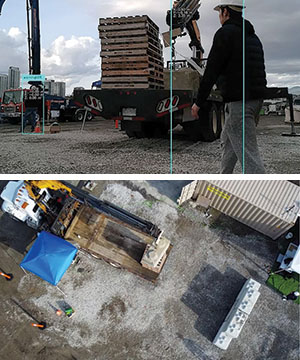Article analyzes effectiveness of membrane roll sizes
Interface Magazine has published “All Thermoplastic Rolls Are Not Equal” by Colin Murphy, principal of Trinity | ERD, Seattle. The article investigates claims it is quicker and more cost-effective to use wide-width rolls in mechanically attached systems by analyzing side-lap attachment spacing and seam-welding lengths and comparing use of wide-width rolls with traditional, narrower rolls.
Trinity | ERD researchers used variables affecting installation speed of a mechanically attached roof covering such as number of fasteners installed into a side lap, roll maneuverability and total lineal footage of welds. Findings revealed for single-ply mechanically attached systems, standard 72- and 81-inch wide rolls are faster to install when compared with wider rolls with 6 inches on center side-lap spacing.
For more information about the research, contact IB Roof Systems, Grapevine, Texas, at ibroof.com/contact-us.
Robots work on experimental job site

|
A team of researchers at the University of British Columbia, Vancouver, demonstrated how its collection of robots could work autonomously on a job site on Mitchell Island in Richmond, British Columbia, according to Construction Dive.
Camera-bearing aerial drones captured details that were used to create digital twins of the job site. Using “as-built” information, AI-equipped cranes and forklifts moved construction materials around the actual site and navigated around obstacles without a human operator.
Tony Yang, a UBC professor, says the impetus for the technology’s development stemmed from labor shortages across the U.S. and Canada. Although the robot technology was usable and job-site ready, it is not yet commercially available.
“Our goal is to ensure workers actually become managers instead of doing the physical hard work,” Yang says. “They are controlling a machine or giving instructions to machines to do the job.”
An autonomous system also can detect whether workers enter an unsafe area. Yang says the software did more than 1,024 checks per second.
In addition, Yang and his team are working with Rogers Communications Inc., a Canadian communications and media company, on a product that would enable contractors to wrap the broader spectrum of digital construction management under the umbrella of a single tech product. The team is also developing a fully autonomous excavator, which will use drawings to dig out the foundation of buildings without human aid.
Yang says the goal of his research is not to take jobs away from workers, though similar claims have been met with skepticism from experts.
Study reveals how artificial intelligence is changing work

|
The rise of generative AI has raised many questions about how the technology will affect the workforce. A global study from the IBM Institute for Business Value shows business leaders are facing talent-related challenges from the skills gap to the need for new operating models.
Executives surveyed estimate 40% of their workforce will need to reskill as a result of implementing AI and automation during the next three years, which could translate to 1.4 billion of the 3.4 billion people in the global workforce, according to World Bank statistics. Respondents also indicated building new skills for existing employees is a top talent issue.
Entry-level employees are expected to see the biggest shift regarding the effects of generative AI. Seventy-seven percent of executive respondents say entry-level positions are already seeing the effects of generative AI; 22% of respondents report the same for executive or senior management roles.
AI can open more possibilities for employees. Eighty-seven percent of respondents believe employees are more likely to be augmented than replaced by AI, though answers vary across functions: 97% of respondents believe employees in procurement are more likely to be augmented than replaced compared with 93% for employees in risk and compliance; 93% for finance; 77% for customer service; and 73% for marketing.
With AI primed to take on manual and repetitive tasks, surveyed employees report engaging in impactful work is the top factor they care about beyond compensation and job security, surpassing flexible work arrangements, growth opportunities and equity. However, surveyed executives indicated impactful work was the least important factor to their employees, putting flexible work arrangements as the most attribute beyond compensation and job security.
The full study is available at ibm.com.



